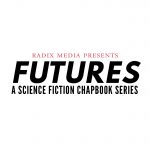lexandra Lopes is a writer based in Portugal, whose short story “Ten Minutes” is one of our favorites to appear in AFTERMATH: Explorations of Loss & Grief. It describes a connection between a child and a young man as they both wait for what seems to be the end of civilization. At a moment where racist border policies rip children away from the arms of their parents, a story where two strangers can build some sort of camaraderie in the Earth’s final moments is a breath of fresh air.
We talked with Alexandra about her contribution to the book and what she has going on next.
Can you introduce yourself as well as your contribution to AFTERMATH?
I’m a writer. That’s the simple answer, I suppose. I didn’t start out as a writer. I went into Graphic Arts first, and before that, Science and Humanities. It wasn’t because I didn’t know what I wanted to do, it was because I was interested in so many things that the idea of having to pick just one didn’t sit right with me. Then I finished school and started working, first in a store, and then in a tattoo studio, and writing wasn’t even a tiny idea in my mind. Not that I didn’t have characters and plots in my mind already, it just wasn’t something I thought I could do.
Then, one day, my sister grew tired of listening to me. She threw a notebook at me and told me: start writing.
I haven’t stopped since. That’s how I knew I was a writer. It wasn’t when I got my first published piece, or when I first got paid for something that I wrote. It was all those years ago when I wrote my very first story and realized I couldn’t see myself doing anything else. Sure, I have a job, but that’s not what I want to do. That’s what I do so that I can write.
My piece for AFTERMATH is the result of my own way of dealing with grief. It’s a fiction piece because I’m a fiction writer, and it’s the way I find to deal with life. It helps me process emotions and understand my emotions better and put them in perspective. I lost my father and grandmother only months apart, and this story represents the helplessness I felt, as well as the inevitability of death, and, finally, the acceptance of that fact.
What attracted you to the theme of the book?
Everything. Grief is such a complex thing. It’s so personal, so intimate. At first, I toyed with the idea of writing a nonfiction piece for this because of how personal it is. In the end, I decided to remain true to myself and write fiction, which allowed me to explore characters in a very raw way.
Aside from that, the fact that this wasn’t simply a fiction anthology but gathered several art forms was something that I thought would be fascinating to see. It’s always amazing to see different art forms explore the same emotion, especially one such as grief.
What are you hoping to convey to readers with your story?
Acceptance, I think. Accept that some things are out of your control, that no matter how much you want to fight against it, there’s nothing you can do. I know, from personal experience, how hard that can be sometimes, and how much pain that can cause you and those you care about.
Compassion, too. Sometimes, all that’s needed is a moment of companionship. It doesn’t need to be some grand act. Being there, sometimes, is all that’s needed.
Talk about some of your favorite projects you’ve been involved with.
Towards the end of last year, a former professor of mine and I got to talking about how we could make writing happen in schools. I brought up the idea of writing workshops set up similar to anthologies. So, the idea is to set up a workshop which would be part of Portuguese/English/French/Spanish/German (or any other language the school offers) classes, and give the kids prompts for them to write short pieces for, the word count depending on the class grade.
We’re working on getting that going for elementary schools and high schools in the district. We’ve already had talks with local libraries and City Halls. By the look of things, we’re hoping to have the first trial writing workshop starting next school year, which means I’m now working on arranging prompts for kids, from ages 7 to 19, and come up with themes and small challenges. It’s a lot of work but I think it could become something amazing if it gets implemented.
What’s next on the horizon?
Next is a novel. It started out as a short-story as a birthday present for a friend of mine. However, the characters gained a life of their own, and it became this full-fledged novel.
It’s cyberpunk, something that I usually don’t venture into. It revolves around Lane, a young woman who grows up in a society where women aren’t allowed to work with technology. Her father was one of the most acclaimed men in the field, and he taught her everything he knew. Once he dies, Lane wants to follow in his footsteps despite what the law is. She cross-dresses as a man to follow her dream. Her talent quickly has her rising in the ranks of the leading company of the time. Of course, her secret doesn’t stay secret for long, and once she’s found out, she’s left with nothing to her name, forced to live on the edges of society. Lane swears to make them regret their decision and starts a revolution that’ll change their whole society.
It’s in the finishing stages and is planned to be up end of September or beginning of October if all goes well.
You can find Alexandra’s excellent story, “Ten Minutes” in our anthology, AFTERMATH: Explorations of Loss & Grief, currently available for purchase in our online store.
And don’t forget to check out our other contributor profiles of Joaquin Fernandez, Stacya Shepard Silverman, Alison McBain, Aneeta Mitha, and Alex DiFrancesco.





